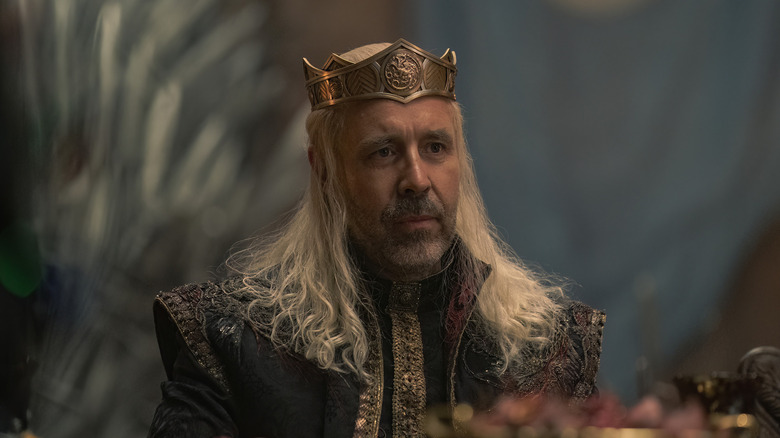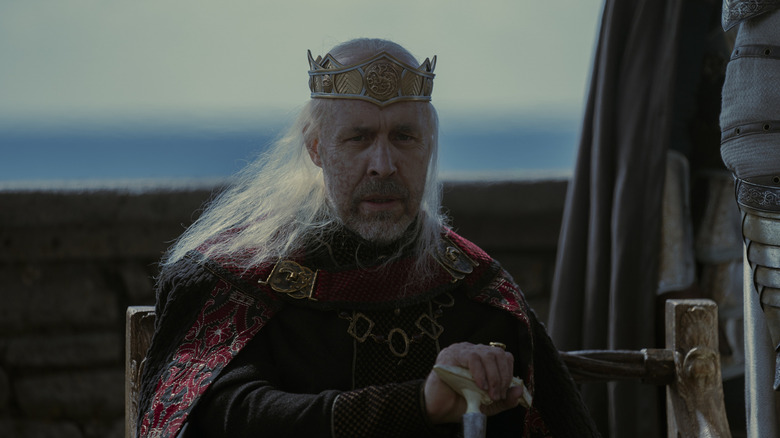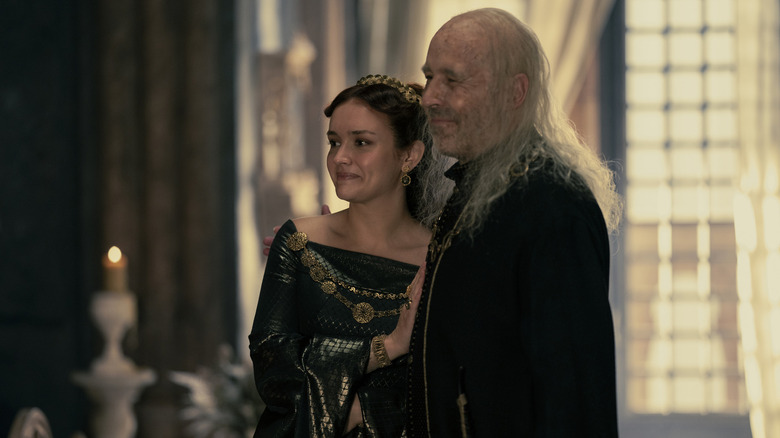House Of The Dragon: Viserys' Death Brought Back Painful Memories For Paddy Considine
"House of the Dragon" — like its predecessor, "Game of Thrones" — is a brutal show. People are burned alive by dragons, bludgeoned with rocks, die during childbirth, lose eyes and arms, and endure all sorts of horrifying physical ailments — and all of that is just in the first season.
Actor Paddy Considine, who was part of many of the most brutal moments, recently spoke to Variety about his role as King Viserys I Targaryen, who didn't survive the debut season that takes place across two decades. Viserys needs to choose his rightful heir when the series kicks off, and that need becomes more and more pronounced as his health declines. According to Considine, he drew from real-life tragedy to play Viserys as his health and physical state plummeted.
"There's a couple of things in it," Considine told Variety. "I'd seen illness myself. My mom ended up blind and lost both of her legs to diabetes. She very much had those qualities that Viserys had, too. She tried to remain dignified, but there was a part of her that had just given up on herself. That was a difficult thing as a son to watch. Also, my wife and daughter watched Episode 8 when it aired in the U.K. I was in another room because I didn't want to see it. My wife says, 'You've done the work. You need to see it,' and she showed me the episode. The end, when he lies in the bed, it was very shocking to me, because I looked the image of my dad when he was dying of cancer. The image of him."
Paddy Considine put his own health at risk to play Viserys as he died
As it turns out, Considine went through his own health struggles playing the ailing Viserys. With each passing episode, the aging king is in worse and worse shape as his underlings, children, and much younger wife squabble over who will take his throne after he's gone, and Considine said that what was required of him to perform this was actually a bit hazardous to his health.
"Playing somebody who's dying is a strange thing, especially a prolonged death," Considine said. "When you do it over a period of days, and your breathing's shallow — my oxygen level started to go down. I had to be taken off set and given regular fresh air, because I was nearly passing out. It's almost like your brain starts to tell your body that you are sick. It's really quite weird."
After a ten-year time jump halfway through the season, Viserys returns and is visibly unwell, giving Considine three episodes to play a king whose body is betraying him slowly and painfully. Considine suffered for his art, but he achieved the result he wanted by playing Viserys to perfection before the character's death.
Losing his father to chronic illness
That death comes in Episode 8, "The Lord of the Tides," which sees a deeply ill Viserys drifting in and out of lucidity as his family watches his body finally fail him. Clad in a golden mask until his final moments — which is meant to mask the many boils and ulcers adorning Viserys' face — Viserys dying is shockingly emotional despite the fact that viewers definitely know it's coming (and it might even seem like a relief to watch a man in pain finally succumb). Considine, as it turns out, brought an extremely personal experience into this performance: losing his own father.
"My father was really fighting," Considine recalled. The nurses came around, they said he has 24 hours. Then it was three days later, and they're looking at you going, I don't know what's keeping him going. I remember one day looking into his eyes, and I just said to him, 'Dad...' — this is very difficult. [Long pause.] But I said, 'Dad, just let go. Just let go, Dad.' And he couldn't. He didn't want to let go."
In his very last moments, Viserys tries to give his wife Alicent (Olivia Cooke) words of wisdom, but ends up taking his last, rattling breath with her by his side. "But sometimes when people pass, I feel like they know," Considine said. "It's like when a dog goes away to die on its own. And I felt that very much with Viserys."


